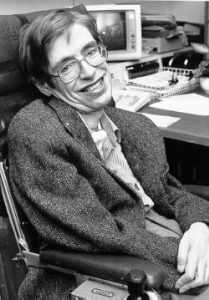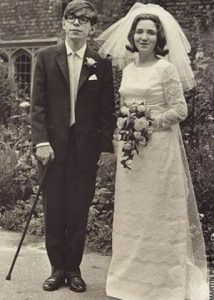I'm going to share with you Stephen Hawking's life story. A great opportunity to evaluate his life.
Well… he was born in Oxford, England, in 1942. At 20, he was a middle-class young man, with a great aptitude for mathematics, a great student, but not the best in the class. No one could have imagined that he would become one of the greatest scientists of the XNUMXth century. Between riots and parties, he completed his graduation course. His parents celebrated this victory at a New Year's party, after all, he had narrowly managed to get approved at Cambridge University to start his doctorate in cosmology. “I'm going to open this wine I had reserved for this moment. To Stephen!” – said his father.
 He served people and passed the bottle to his son across the table. Stephen took it, but couldn't steady it. His fist shook and he was only able to fill the cup a third. The rest ended up on the tablecloth, which was all stained. Everyone was silent, but his father continued: “Let's have a toast! To Stephen!” And everyone toasted and noticed the boy's lack of coordination. That night, his father promised that he would help him through college.
He served people and passed the bottle to his son across the table. Stephen took it, but couldn't steady it. His fist shook and he was only able to fill the cup a third. The rest ended up on the tablecloth, which was all stained. Everyone was silent, but his father continued: “Let's have a toast! To Stephen!” And everyone toasted and noticed the boy's lack of coordination. That night, his father promised that he would help him through college.
During the last year, Stephen began to experience increasing motor difficulties. He tripped over furniture, spoke less clearly, and struggled to fit the key into the lock. And in a few weeks, the doctors announced his rare disease: ALS – Amyotrophic lateral sclerosis – degeneration of the voluntary muscles of the body that usually leads to death in 2 or 3 years. So he assumed he would suffer irreversible paralysis and his life would end very quickly.
He went into depression. For two weeks he locked himself in his room. “Why is this happening to me?” He was gripped by fear, anger and anxiety. But on a freezing English winter morning, he said: ENOUGH!!! He said that to his mind. He decided not to complain anymore, he would do something wonderful and enjoy the process. After a long time, he said that this time of convalescence helped him to create a new philosophy of life: “Complaining is useless and a waste of time.. Even if I lose all mobility, I will have many wonderful things to do. Even without going very far, I can study the cosmos.” So he got up, shaved, showered, and left the room. He had a twinkle in his eye and he would enjoy every minute that life gave him. Three years later, he was completing one of the best works in the history of cosmology. They were facing the first mathematical theory of the beginning of the universe. That was amazing!
 His theories explained the formation and structure of the universe clearly. They extended Einstein's discoveries and drew for the first time what the cosmos, black holes, light, time were like… In 1965, he married his first wife and had two children. The disease progressed and he was put in a wheelchair. He was losing mobility, leaving only the muscles of his fingers. He repeated: “Complaining is a waste of time.” He continued researching, racking up awards, and published books.
His theories explained the formation and structure of the universe clearly. They extended Einstein's discoveries and drew for the first time what the cosmos, black holes, light, time were like… In 1965, he married his first wife and had two children. The disease progressed and he was put in a wheelchair. He was losing mobility, leaving only the muscles of his fingers. He repeated: “Complaining is a waste of time.” He continued researching, racking up awards, and published books.
For many, their most valuable gift was not their genius, but their positivity and their message of happiness. In an interview with the newspaper La Vanguardia, he stated: “I have nothing positive to say about my illness, but it taught me not to regret it, because there are others worse than me, and I was able to continue doing what I wanted. Also, the truth is, I'm happier now than I was before. I would tell all the people who are not doing well that every black hole has a way out, because there is no worse hole than the one I live in. My expectations were reduced to zero when I was 21. The doctors diagnosed me with a disease that is often fatal. They said I wouldn't get to finish my doctorate, and since then everything has felt like a bonus. That was a dark period, I was depressed, but finally I continued to live and fight. I stopped feeling like the worst of beings to become a hero.”
To this day he remains a hero of his own life. So when you start to complain a lot about life, you are suffering a lot, ask this question: “What would Stephen Hawking say to me if he were in front of me? What would he say about the obstacles I'm complaining about?"
Think about it and let's go!

























